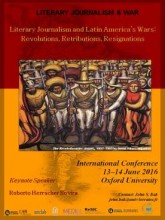Working in partnership with various research centers – Oxford Centre for Life-Writing (Wolfson College, Oxford University, UK), Medill School of Journalism (Northwestern University, USA), ReSIC (Université Libre de Bruxelles, Belgium), and the Experimental Media Lab (Academy of Fine Arts Saar, Germany) – the research group I.D.E.A. (“Théories et pratiques de l’interdisciplinarité dans les études anglophones”) is announcing a call for papers for the conference “Literary Journalism and Latin American Wars.” The conference will be held at Wolfson College, Oxford University, from 13-14 June 2016. The keynote speaker will be Argentinean journalist and scholar Roberto Herrscher Rovira (Universitat de Barcelona), whose books Los viajes del Penélope (2007) and Periodismo narrativo (2012) show the importance literary journalism has in the practice and history of Latin American letters.
When Gabriel García Márquez died in April 2014, the world of letters lost one its most talented novelists and influential journalists of the 20th century. “Gabo,” who was equally known for his “magical realism” as for his support of the Castro regime in Cuba, witnessed and recorded the political and social unrest that is frequently associated with the development of South America. Like Márquez, many Latin American authors resorted to literary journalism to capture their countries’ civil wars, revolutions or pogroms. Jorge Ibargüengoitia wrote about the Mexican Revolution of 1910 in Los Relámpagos de Agosto (1964) and later about the Mexican War of Independence in Los pasos de López (1981). In Operación Masacre, Rodolfo Jorge Walsh described the events following the Revolución Libertadora in Argentina in 1955. Biografía de un cimarrón by the Cuban author Miguel Barnet tells of the story of a Cuban ex-slave of African descent that fought during the Cuban War of Independence (1895–98). The book, published seven years after the Cuban Revolution ended in 1966, is considered a watershed in the development of Latin American literary journalism.
Latin American literary journalism is thus rarely separated from Latin American politics throughout the 19th and 20th centuries. Dictatorships – the most notorious being perhaps Chile’s Pinochet – civil wars and colonial wars all inspired the work of literary journalists who wrote knowing that reprisals would inevitably follow the publication of their work. The poet Heberto Padilla was imprisoned in 1971, and Rodolfo Walsh was assassinated by an Argentinean militia in 1977. Faced with such realities, Latin American authors had to be deceptive to get their stories published and read. Potential questions on the history of the genre in Latin America that could be addressed include:
- Is Latin American literary journalism essentially a militant journalism?
- How did Latin American literary journalists avoid censorship?
- What differences can be noticed between works written during dictatorships or in colonial times and those produced later?
- Latin American authors were forced to invent specific genres (crónica, crônica, testimonio) that used literary techniques which allowed them to criticize authoritarian governments without putting their lives in danger. How subjective could the authors be when writing their stories? What impact did their stories have on the nation and its people?
- How much distance did literary journalists – Latin American or otherwise – put between themselves and the object of their writing?
- Does an authorial voice during times of repression or a preponderant political agenda within a text limit its universality and keep it from even being considered a classic?
Latin American literary journalism was unavoidably influenced by an imported/exported European reportage tradition, as well as by America’s “New Journalism” of the 1960s and 70s. While Tom Wolfe, Hunter S. Thompson and Joan Didion were exploring the consequences counterculture had on an imploding America (with Didion later turning to Latin America in Salvador), Latin American authors were still largely trying to find a voice to express the struggles experienced by their peoples. Even though literary journalism on all three continents had traditions that predate the 1960s, it is safe to say that the genre came of age at this time, and Latin America’s interactions with Europe and the United States played an important role in the making of its own brand of literary journalism, by whatever name it was called – periodismo narrativo, jornalismo literário or periodismo literario. The journalistic influences from Europe and the United States raise an incalculable number of questions regarding the essence of Latin American literary journalism to which this conference hopes to provide answers. Potential questions on the transformation of the genre in Latin America could include:
- What effect did foreign literary journalists have on the local form when they began writing about Latin America? Did Latin literary journalists adopt more of an American or a European sensibility when writing about their countries’ social and political issues.
- When Germans came to Brazil in the 19th century, some of them decided to write in German. Did it change the nature of literary journalism in this country and, if so, how?
- What effect did moving to the United States have on writers who were born in Latin America, such as Alma Guillermoprieto, who writes for the American and the British press and covered the El Mozote massacre?
- When Cuba began rejecting Euro-American culture in the post-revolution 60s, did its authors shun the influence they had received abroad or did they simply sublimate it?
The diversity of viewpoints will allow us to understand how literary journalism has found its place in Latin America and contributed to the building of a sense of nationalism, between democracy and authoritarianism, between unity and fragmentation. English will be the conference’s principal language, but papers can also be presented in Spanish, Portuguese and French.
Please send abstracts of 300 words and a brief cv to John S. Bak (john.bak@univ-lorraine.fr) and Marilyne Tonelli (marilyne.tonelli@orange.fr) by 15 January 2016.

